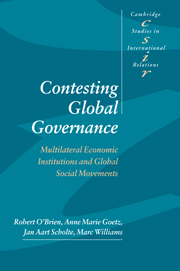Book contents
- Frontmatter
- Contents
- Preface
- List of abbreviations
- 1 Contesting global governance: multilateralism and global social movements
- 2 The World Bank and women's movements
- 3 The World Trade Organization and labour
- 4 The World Bank, the World Trade Organization and the environmental social movement
- 5 The International Monetary Fund and social movements
- 6 Complex multilateralism: MEIs and GSMs
- References
- Index
- CAMBRIDGE STUDIES IN INTERNATIONAL RELATIONS
5 - The International Monetary Fund and social movements
Published online by Cambridge University Press: 22 September 2009
- Frontmatter
- Contents
- Preface
- List of abbreviations
- 1 Contesting global governance: multilateralism and global social movements
- 2 The World Bank and women's movements
- 3 The World Trade Organization and labour
- 4 The World Bank, the World Trade Organization and the environmental social movement
- 5 The International Monetary Fund and social movements
- 6 Complex multilateralism: MEIs and GSMs
- References
- Index
- CAMBRIDGE STUDIES IN INTERNATIONAL RELATIONS
Summary
The growth of the International Monetary Fund (IMF, or ‘the Fund’) presents one of the most pronounced cases of expanding global economic governance in the late twentieth century. Particularly since the 1970s, accelerated globalisation has propelled the Washington-based Fund into various new areas: training and technical assistance; surveillance of macroeconomic policy; structural adjustment in the South; post-communist transition in the East; and regulation of financial markets, including several major rescue operations. To deal with this enlarged agenda, as well as a much-expanded membership, the IMF has obtained a much larger staff and hugely increased financial resources. To be sure, it would be mistaken to depict the Fund as an omnipotent ruler of the contemporary world economy; however, its voice carries far in global markets, in national economic policies, and – eventually – in local and household budgets.
The IMF's expansion has not been universally welcomed. On the contrary, critics have raised fundamental objections to both the general premises and the specific content of much of the Fund's policy advice. IMF management and staff have on the whole proceeded from neoliberal assumptions that stabilisation, liberalisation, deregulation and privatisation together yield long-term economic health and human betterment in a globalising world. Opponents in social movements have sought to break this neoliberal consensus at the Fund and to move global monetary and financial governance in alternative directions.
This chapter analyses the aims, activities, impacts and difficulties of campaigns to change the IMF.
- Type
- Chapter
- Information
- Contesting Global GovernanceMultilateral Economic Institutions and Global Social Movements, pp. 159 - 205Publisher: Cambridge University PressPrint publication year: 2000



